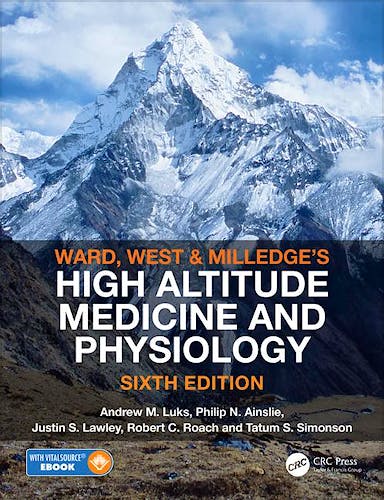

No hay productos en el carrito



Ward, Milledge and West’s High Altitude Medicine and Physiology
Luks, A. — Ainslie, P. — Lawley, J. — Roach, R. — Simonson, T.
6ª Edición Enero 2021
Inglés
Tapa dura
554 pags
1500 gr
22 x 28 x 4 cm
ISBN 9780367001353
Editorial CRC PRESS
LIBRO IMPRESO
-5%
181,50 €172,43 €IVA incluido
174,52 €165,80 €IVA no incluido
Recíbelo en un plazo de
2 - 3 semanas
Foreword
Acknowledgments
- 1. History of high altitude medicine and physiology
SECTION I. THE ENVIRONMENT AND ITS PEOPLE
- 2. The atmosphere
- 3. Geography
- 4. High altitude residents
- 5. Travelers and workers at high altitude
- 6. Genetics and genomics of exposure to high altitude
SECTION II. PHYSIOLOGIC RESPONSES TO HYPOXIA
- 7. Acclimatization
- 8. Pulmonary gas exchange
- 9. Control of breathing
- 10. Oxygen affinity and acid–base balance
- 11. Cardiovascular system
- 12. Central nervous system
- 13. Hematologic responses
- 14. Peripheral tissues
- 15. Energy balance and metabolism
- 16. Endocrine and metabolism
- 17. Sleep
- 18. Exercise
- 19. Physiology of extreme altitude
SECTION III. CLINICAL HIGH ALTITUDE MEDICINE
- 20. Acute mountain sickness
- 21. High altitude cerebral edema
- 22. High altitude pulmonary edema
- 23. Other medical conditions that occur at high altitude
- 24. Chronic altitude illness
- 25. High altitude travel with preexisting medical conditions
- 26. Children, the elderly, and women at high altitude
- 27. Other environmental illnesses in the mountains
Index
This pre-eminent work has developed over six editions in response to man's attempts to climb higher and higher unaided, and to spend more time at altitude for both work and recreation. Building on this established reputation, the new and highly experienced authors provide a fully revised and updated text that will help doctors continue to improve the health and safety of all people who visit, live or work in the cold, thin air of high mountains.
The sixth edition remains invaluable for any doctor accompanying an expedition or advising patients on a visit to altitude, those specialising in illness and accidents in high places, and for physicians and physiologists who study our dependence on oxygen and the adaptation of the body to altitude.
Dr. Luks MD is a professor in the Division of Pulmonary Medicine whose clinical interests include critical-care medicine and high-altitude medicine and physiology. Dr. Luks earned his bachelor's degree from the Duke University, where he also minored in watching Duke basketball, before attaining a master's degree in political science at Stanford University. He then completed medical school at the University of California, San Diego. Following medical school, he came to Seattle where he has since completed residency training in the UW Internal Medicine Residency Training Program, served as a chief resident in the same program and completed a fellowship in pulmonary and critical care medicine. Since joining the faculty in the Division of Pulmonary and Critical Care Medicine in 2007, he worked for one year as a night-time intensivist at the University of Washington Medical Center before transitioning to Harborview Medical Center where he cares for patients on multiple intensive care unit services in the hospital. In addition to his work caring for critically ill patients, Dr. Luks provides consultative services on an outpatient basis to individuals seeking advice about travel and other activities at high altitude. Beyond his clinical duties, Dr. Luks has an active program of scholarly activity related to medical education. In addition to teaching resident and fellow-level trainees, Dr. Luks is actively involved in teaching medical students in the University of Washington’s School of Medicine, serving as course chair for HuBio 541-The Respiratory System, director of the Medical Intensive Care Unit sub-internship for fourth year medical students and leading elective courses related to critical care medicine and wilderness medicine. He also maintains an active writing program with the bulk of his publications related to high altitude medicine and physiology, exercise physiology and other topics.
Philip Ainslie PhD is Professor & Canada Research Chair in Cerebrovascular Physiology and Co-Director, Centre for Heart, Lung & Vascular Health at the University of British Columbia. The specific focus of his research is directed to the integrated mechanisms which regulate human cerebral blood flow in health and disease. Three main inter-related areas of research are currently being explored: 1. Mechanisms of cerebral blood flow regulation, 2. Influence of environmental stress on cerebrovascular function (with focus on hypoxia and temperature regulation) and 3. Influence of exercise training on cerebrovascular function. Since completing his PhD in 2002, he has authored a book, published more than 120 peer-reviewed publications, 10 major book chapters and has successfully supervised >15 post-graduate students.
Justin S. Lawley is an Instructor for Internal Medicine, Institute for Exercise and Environmental Medicine, Texas Health Presbyterian Dallas and University of Texas Southwestern Medical Center, Dallas, Texas, USA
Tatum Simonson is Assistant Adjunct Professor, Department of Medicine, University of California, San Diego, USA
© 2025 Axón Librería S.L.
2.149.0